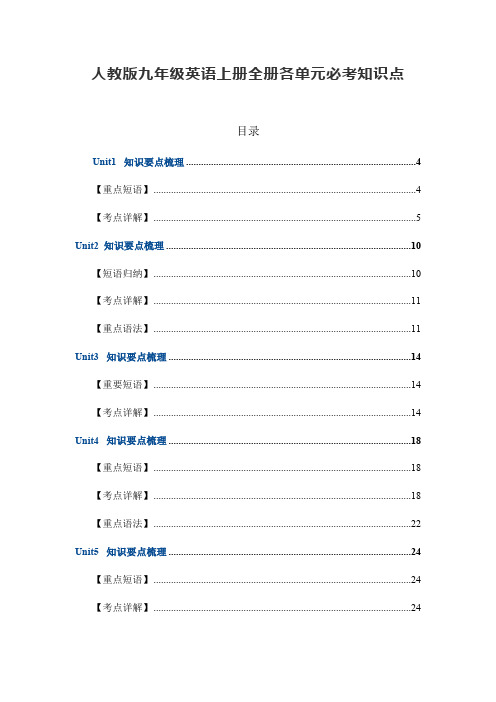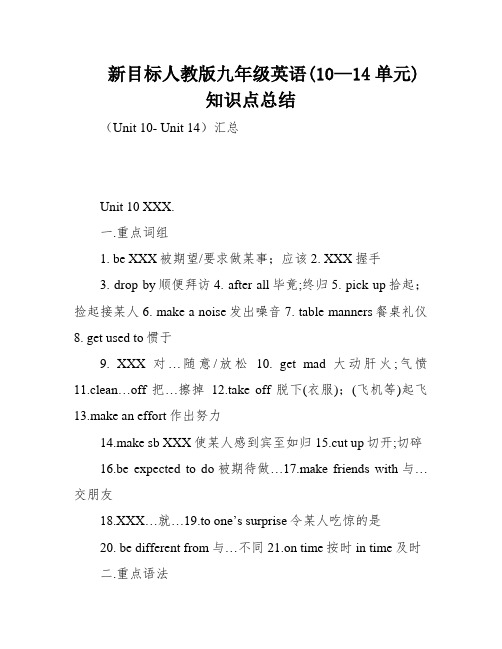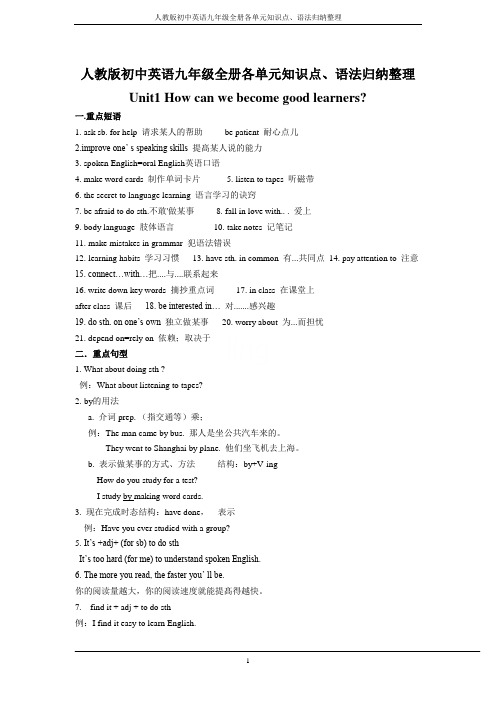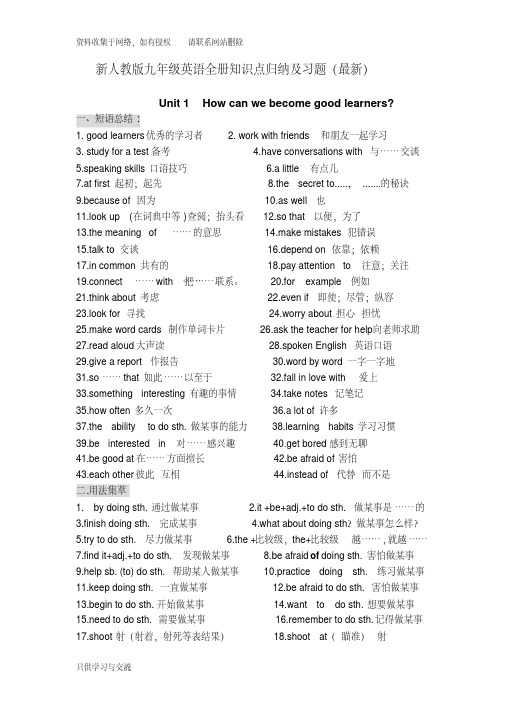人教版九年级英语各单元知识点总结
人教版九年级英语知识点归纳

人教版九年级英语知识点归纳一、语法知识点1. 一般现在时:用于描述经常发生的行为或真相,动词原形加s/es。
2. 一般过去时:用于描述过去发生的动作或状态,动词过去式形式。
3. 现在进行时:用于描述当前正在进行的动作,be动词+动词ing形式。
4. 现在完成时:用于描述过去发生的动作对现在造成的影响,have/has + 过去分词。
5. 一般将来时:用于描述将来的动作,will/shall + 动词原形。
6. 情态动词:can, could, may, might, must, shall, should, will, would等,用于表达能力、可能性、推测、必要性等。
7. 定语从句:用于对名词进行修饰和限制,引导词有关系代词和关系副词。
8. 倒装句:用于强调句子中的某一部分,将助动词或情态动词放在主语之前。
9. 被动语态:用于强调动作的承受者,be动词+过去分词。
10. 状语从句:用于修饰句子中的动作或状态,引导词有时间、原因、条件等。
二、词汇知识点1. 动词短语:由动词和副词、介词构成的短语,如give up,look after, think of等。
2. 同义词和反义词:指意义相同或相反的词语,如happy和glad、buy和sell等。
3. 词汇拓展:指根据前缀、后缀或词形变化,拓展词汇的能力。
4. 高频词汇:指经常出现在九年级英语课本和考试中的单词,如important, improve, knowledge等。
5. 词义辨析:指对意义相近但用法不同的词进行区分,如listen和hear、borrow和lend等。
三、阅读技巧1. 主旨大意:通过阅读文章的首句、末句和段落标题等,找出文章的主题或中心思想。
2. 查找信息:通过快速阅读或扫读,找出与特定问题或关键词相关的信息。
3. 推理判断:根据文章中的暗示或细节推断出未写明的信息或作者的观点。
4. 阅读策略:如预测题目、通读全文、找关键词等,帮助提高阅读效率和准确性。
新人教版九年级英语(全一册)知识点

新人教九年级英语全一册复习Unit1《How can we become good learners?》知识点【短语归纳】1. have conversation with sb. 同某人谈话2. too…to… 太……而不能3. the secret to… ……的秘诀4. be afraid of doing sth./ be afraid to do sth. 害怕做某事5. look up 查阅6. repeat out loud 大声跟读7. make mistakes in 在……方面犯错误8. connect ……with… 把……和……连接/联系起来9. get bored 感到厌烦10. be stressed out 焦虑不安的11. pay attention to 注意;关注12. depend on 取决于;依靠13. the ability to do sth.. 做某事的能力【单元知识点】1. by + doing :通过……方式(by是介词,后面要跟动名词,也就是动词的ing形式)2. talk about 谈论,议论,讨论The students often talk about movie after class. 学生们常常在课后讨论电影。
talk to sb= talk with sb 与某人说话3. 提建议的句子:①What/ how about +doing sth.? 做…怎么样?(about后面要用动词的ing形式,这一点考试考的比较多)如:What/ How about going shopping?②Why don't you + do sth.? 你为什么不做…?(注意加黑的部分用的是动词的原型)如:Why don't you go shopping?③Why not + do sth. ? 为什么不做…?(注意加黑的部分用的是动词的原型)如:Why not go shopping?④Let's + do sth. 让我们做…吧。
九年级上册英语人教版笔记

九年级上册英语人教版笔记一、Unit 1 How can we become good learners?1. 重点单词。
- aloud:adv. 大声地;出声地。
例如:Read aloud so that we can all hear you.(大声朗读以便我们都能听到你。
)- pronunciation:n. 发音;读音。
Your pronunciation is very good.(你的发音很好。
)- patient:adj. 有耐心的;n. 病人。
Be patient with children.(对孩子们要有耐心。
)- expression:n. 表达(方式);表示。
Facial expressions can show our feelings.(面部表情能展示我们的感受。
)2. 重点短语。
- by doing sth.:通过做某事。
We can improve our English by reading English books.(我们可以通过读英语书提高英语。
)- make mistakes:犯错。
Everyone makes mistakes when they learn something new.(每个人在学习新东西的时候都会犯错。
)- look up:查阅;抬头看。
Look up the new word in the dictionary.(在词典里查阅这个新单词。
)3. 重点句型。
- How do you study for a test?(你如何为考试而学习?)- I study by working with a group.(我通过小组合作来学习。
)- The more you read, the faster you'll be.(你读得越多,你就会读得越快。
)二、Unit 2 I think that mooncakes are delicious!1. 重点单词。
人教版九年级英语上册各单元知识点归纳总结

人教版九年级英语上册全册各单元必考知识点目录Unit1 知识要点梳理 (4)【重点短语】 (4)【考点详解】 (5)Unit2 知识要点梳理 (10)【短语归纳】 (10)【考点详解】 (11)【重点语法】 (11)Unit3 知识要点梳理 (14)【重要短语】 (14)【考点详解】 (14)Unit4 知识要点梳理 (18)【重点短语】 (18)【考点详解】 (18)【重点语法】 (22)Unit5 知识要点梳理 (24)【重点短语】 (24)【考点详解】 (24)【重点语法】 (27)Unit6 知识要点梳理 (30)【重点短语】 (30)【考点详解】 (30)【重点语法】 (33)Unit1 知识要点梳理【重点短语】1. have conversation with sb. 同某人谈话2. too…to… 太……而不能3. the secret to… ……的秘诀4. be afraid of doing sth./ be afraid to do sth. 害怕做某事5. look up 查阅6. repeat out loud 大声跟读7. make mistakes in 在……方面犯错误8. connect ……with… 把……和……连接/联系起来9. get bored 感到厌烦10. be stressed out 焦虑不安的11. pay attention to 注意;关注12. depend on 取决于;依靠13. the ability to do sth.. 做某事的能力【考点详解】1. by + doing 通过……方式(by是介词,后面要跟动名词,也就是动词的ing 形式)2. talk about 谈论,议论,讨论The students often talk about movie after class. 学生们常常在课后讨论电影。
talk to sb= talk with sb 与某人说话3. 提建议的句子:①What/ how about +doing sth.? 做…怎么样?(about后面要用动词的ing形式,这一点考试考的比较多)如:What/ How about going shopping?②Why don't you + do sth.? 你为什么不做…?如:Why don't you go shopping?③Why not + do sth. ? 为什么不做…?如:Why not go shopping?④Let's + do sth. 让我们做…...吧。
人教版九年级英语上册各单元知识点汇总

人教版九年级英语上册各单元知识点汇总UNIT1 How can we become good learners?SectionA重点单词听,并跟读下列单词l. textbook n.教科书;课本2. conversation n.交谈;谈话3. aloud adv.大声地;出声地4. pronunciation n.发音;读音5. sentence n.句子6. patient adj.有耐心的n.病人7. expression n.表情;表示;表达方式8. discover v.发现;发觉9. secret n.秘密;秘诀adj.秘密的;保密的10. grammar n.语法l1. repeat v.重复;重做l2. note n.笔记;记录v.注意;指出13. pal n.朋友;伙伴14. chemistry n.化学15. memorize v.记忆;记住16. pattern n.模式;方式听,并跟读下列单词变形。
l. conversation —converse (v.会话)2. patient —patience (n.耐心)3. expression —express (v.表达)1. discover —discovery ( n.发现)5. improve —improvement( n.改善)重点短语听,并跟读下列短语。
l. make word cards 制作单词卡片2. ask sb. for ... 向某人寻求……3. have conversations with sb. 和某人谈话4. at first 起初, 起先5. give a report 做报告6. take notes 记/做笔记7. word by word 逐词地8. so... that 如此……以至于9. write e-mails to sb. 给某人写电子邮件10. be afraid to do sth. /be afraid of doing sth.害怕做某事11. because of 由于;因为12. fall in love with 爱上13. a piece of cake 小菜一碟14. look up( 在词典、参考书中或通过电脑)查阅;抬头看15. so that 以便重点句型听,并跟读下列句子。
新目标人教版九年级英语(10—14单元)知识点总结

新目标人教版九年级英语(10—14单元)知识点总结(Unit 10- Unit 14)汇总Unit 10 XXX.一.重点词组1. be XXX被期望/要求做某事;应该2. XXX握手3. drop by顺便拜访4. after all毕竟;终归5. pick up拾起;捡起接某人6. make a noise发出噪音7. table manners餐桌礼仪8. get used to惯于9. XXX对…随意/放松10. get mad大动肝火;气愤11.clean…off把…擦掉12.take off脱下(衣服);(飞机等)起飞13.make an effort作出努力14.make sb XXX使某人感到宾至如归15.cut up切开;切碎16.be expected to do被期待做…17.make friends with与…交朋友18.XXX…就…19.to one’s surprise令某人吃惊的是20. be different from与…不同21.on time按时in time及时二.重点语法1.(1)suppose:猜测;假定XXX透露施展阐发“推测;假定”,that可省例:XXX.(2)be XXX被期望做某事,应该做某事。
相当于should 和ought to例:XXX.XXX to say hello to the foreigners.【练】You are supposed _____ hands when you meet for the first time.A. to shakeB. shakeC. shakingD. shook2. make plans to do == plan to do.打算做某事例She has made plans to go to Beijing.=She has planed to go to Beijing.go out of one’s way to do特意,专门做某事例:He went out of his way to make me happy.3. In Switzerland,it’XXX.阐发:it是方式主语,不定式是真正的主语。
人教版初中英语九年级全册各单元知识点、语法归纳整理

人教版初中英语九年级全册各单元知识点、语法归纳整理Unit1 How can we become good learners?一.重点短语1. ask sb. for help 请求某人的帮助be patient 耐心点儿2.improve one’ s speaking skills 提髙某人说的能力3. spoken English=oral English英语口语4. make word cards 制作单词卡片5. listen to tapes 听磁带6. the secret to language learning 语言学习的诀窍7. be afraid to do sth.不敢'做某事8. fall in love with.. . 爱上9. body language 肢体语言10. take notes 记笔记11.make mistakes in grammar 犯语法错误12.learning habits 学习习惯13. have sth. in common 有...共同点14. pay attention to 注意15. connect…with…把....与....联系起来16. write down key words 摘抄重点词17. in class 在课堂上after class 课后18. be interested in… 对.......感兴趣19. do sth. on one’s own 独立做某事20. worry about 为...而担忧21. depend on=rely on 依赖;取决于二.重点句型1. What about doing sth ?例:What about listening to tapes?2.by的用法a. 介词 prep. (指交通等)乘;例:The man came by bus. 那人是坐公共汽车来的。
九年级英语全一册(1~14单元)知识点归纳

新人教版九年级英语全册知识点归纳及习题(最新)Unit 1 How can we become good learners?一、短语总结:1. good learners 优秀的学习者2. work with friends 和朋友一起学习3. study for a test 备考4.have conversations with 与……交谈5.speaking skills 口语技巧6.a little 有点儿7.at first 起初;起先8.the secret to......,.......的秘诀9.because of 因为10.as well 也11.look up (在词典中等)查阅;抬头看12.so that 以便,为了13.the meaning of ……的意思14.make mistakes 犯错误15.talk to 交谈16.depend on 依靠;依赖17.in common 共有的18.pay attention to 注意;关注把……联系。
20.for example 例如19.connect ……with ……21.think about 考虑22.even if 即使;尽管;纵容23.look for 寻找24.worry about 担心担忧25.make word cards 制作单词卡片26.ask the teacher for help 向老师求助27.read aloud 大声读28.spoken English 英语口语29.give a report 作报告30.word by word 一字一字地31.so……that 如此……以至于32.fall in love with 爱上33.something interesting 有趣的事情34.take notes 记笔记35.how often 多久一次36.a lot of 许多37.the ability to do sth. 做某事的能力38.learning habits 学习习惯39.be interested in 对……感兴趣40.get bored 感到无聊41.be good at 在……方面擅长42.be afraid of 害怕43.each other 彼此互相44.instead of 代替而不是二.用法集萃1. by doing sth. 通过做某事2.it +be+adj.+to do sth. 做某事是……的3.finish doing sth. 完成某事4.what about doing sth.?做某事怎么样?5.try to do sth. 尽力做某事6.the +比较级,the+比较级越……,就越……7.find it+adj.+to do sth. 发现做某事8.be afraid of doing sth. 害怕做某事9.help sb. (to) do sth. 帮助某人做某事10.practice doing sth. 练习做某事11.keep doing sth. 一直做某事12.be afraid to do sth. 害怕做某事13.begin to do sth. 开始做某事14.want to do sth. 想要做某事15.need to do sth. 需要做某事16.remember to do sth. 记得做某事17.shoot 射(射着,射死等表结果)18.shoot at(瞄准)射Unit1 检测题一.单项选择1.—_______ do you study English? —By listening to tapes.A. HowB. WhereC. WhenD. Why2.You can improve your English practicing more. A.by B.with C.of D.in3. Why not practice your _________English in _________ English-speaking country?A. speaking, aB. speaking, anC. spoken, an4. ______conversations with others is one of the secrets to _____a successful learner.A. Practice, becomeB. Practice, becomingC. Practicing, becoming5 ---There’re a few new words in the article? ---What about _________in your dictionary? A. looking it up B. looking up it C. looking them up6. We’ll go out to play ______ it rains tomorrow. A. so B. unless C. because7. Can you __which is the right answer to the question? A. look for B. find C. find out8. Jenny used to be afraid to ________in class, so she always ________nothing.A. speak, talkedB. speak, saidC. say, spoke9.— Why not listen to BBC news to improve your listening skills?C. such; that—It’s ______ difficult _____ I can’t follow. A. too; to B. so; that10. A good learner often thinks about ________he needs to practice more.A. thatB. whatC. how11.--I’m g oing to listen ____the tape. --OK. Remember to listen ____the key words.A. to, toB. to ,forC. for, to12. ________or not you can learn well depends on your learning habits.A. IfB. WeatherC. Whether13. I have finished _________my report. May I start to learn ________the guitar?A. writing, playingB. writing, to playC. to write, playing14. ---I often make mistakes ____grammar. ---Why not ask your teacher ____help?A. in, toB. in, forC. at, to15. _________write down the new words in your notebook?A. Would you likeB. How aboutC. Could you please16. ---Jack used to have ____writing practice. ---Yes, and he had learned ______.A. a lot of, a lot ofB. a lot of, a lotC. a lot, a lot of17. The more careful you are, ________mistakes you’ll make.A. fewerB. the fewerC. the less__mistakes. Instead, they learn ________mistakes.18. Good learners aren’t afraid ___A. of making, inB. to make, fromC. to make, in19. For the first time, pay attention _________quickly to get the main ideas.A. to readB. readingC. to reading20.I discovered that listening to is the secret language learning.A. something interesting, toB. interesting something, toC. something interested, ofD. interested something of21.Jenny found it very easy English well.A. learningB. to learnC. learnD. learned22. He_____ with the girl with golden hair and will soon get married____ her.A. falls in love; toB. is in love; toC. loves; withD. loves; to23. My father thinks _____ is a great way to learn English.A. study grammar.B. I study grammar.C. studying grammar.D. studies grammar24 Why not ___ your teacher for help when you can’t finish _____ it by yourself?A. ask; writeB. to ask; writingC. ask; writingD. asking; write25. — I wonder if I can learn English well.—. All things are difficult before they are easy.A. I am afraid soB. You’re slowC. It takes timeD. It’s a piece of cake26 You’ll find _____________ easy to learn it well. A. thatB. its C. it D. this__________.27. –I don’t have a partner to practice English ____---Why not join an English language club to practice _______________?A. /; speakingB. with; to speakC. /; to speakD. with; speaking28. ---She hardly makes mistakes _________English grammar.---No, it seems that she was born ________the ability to learn languages.A. in, withB. with, inC. in, inD. with, with二用所给单词的适当形式填空。
- 1、下载文档前请自行甄别文档内容的完整性,平台不提供额外的编辑、内容补充、找答案等附加服务。
- 2、"仅部分预览"的文档,不可在线预览部分如存在完整性等问题,可反馈申请退款(可完整预览的文档不适用该条件!)。
- 3、如文档侵犯您的权益,请联系客服反馈,我们会尽快为您处理(人工客服工作时间:9:00-18:30)。
九年级英语全册各单元知识点总结Unit 1 How can we become good learners?一、短语:1.have conversation with sb. 同某人谈话2.connect …with… 把…和…连接/联系起来3.the secret to… ……的秘诀4.be afraid of doing sth./to do sth. 害怕做某事5.look up 查阅6.repeat out loud 大声跟读7.make mistakes in 在……方面犯错误8.get bored 感到厌烦9.be stressed out 焦虑不安的10.pay attention to 注意;关注11.depend on 取决于;依靠12.the ability to do sth. 做某事的能力二、知识点:1. by + doing:通过……方式(by是介词,后面要跟动名词,也就是动词的ing形式);2. a lot:许多,常用于句末;3. aloud, loud与loudly的用法,三个词都与“大声”或“响亮”有关。
①aloud是副词,通常放在动词之后。
①loud可作形容词或副词。
用作副词时,常与speak, talk, laugh等动词连用,多用于比较级,须放在动词之后。
①loudly是副词,与loud同义,有时两者可替换使用,可位于动词之前或之后。
4. not …at all:一点也不,根本不,not经常可以和助动词结合在一起,at all 则放在句尾;5. be / get excited about sth.:对…感到兴奋;6. end up doing sth:终止/结束做某事;end up with sth.:以…结束;7. first of all:首先(这个短语可用在作文中,使得文章有层次);8. make mistakes:犯错make a mistake 犯一个错误;9. laugh at sb.:笑话;取笑(某人)(常见短语)10. take notes:做笔记/记录;11. native speaker 说本国语的人;12. make up:组成、构成;13. deal with:处理、应付;14. perhaps = maybe:也许;15. go by:(时间)过去;16.each other:彼此;17.regard… as … :把…看作为…;18.change… into…:将…变为…;19. with the help of sb. = with one's help 在某人的帮助下(注意介词of和with,容易出题)20. compare … to …:把…比作… compare with 拿…和…作比较;21. instead:代替,用在句末,副词;instead of sth / doing sth:代替,而不是(这个地方考的较多的就是instead of doing sth,也就是说如果of后面跟动词时,要用动名词形式,也就是动词的ing形式)22.Shall we/ I + do sth.? 我们/我…好吗?23. too…to:太…而不能,常用的句型是too+形容词/副词+ to do sth.Unit 2 I think that moon cakes are delicious!一、短语:1. the Lantern Festival 元宵节2. the Dragon Boat Festival 端午节3. the Water Festival 泼水节4. remind sb. of 使某人想起5. eat five meals a day 一天吃五餐6. put on five pounds 体重增加了五磅7. treat sb. with. 用/以……对待某人8. be similar to... 与.......相似9. end up 最终成为/处于10. share sth. with sb. 与……分享……11. as a result结果12. one... the other... (两者中的) 一个…另一个…13. take sb. out for dinner 带某人出去吃饭14. dress up 乔装打扮15. haunted house 鬼屋16. the beginning of new life 新生命的开始二、知识点:1.宾语从句:(三大考点:引导词、时态和语序。
)宾语从句在复合句中作主句的宾语,由连接词+主语+谓语构成,常由下面的这些词引导:①由that 引导,表示陈述意义,that可省略:He says (that) he is at home. 他说他在家里。
①由if 或whether引导,表示一般疑问意义(带有是否、已否、对否等):I don’t know if / whether Wei Hua likes fish. 我不知道韦华是否喜欢鱼。
①由连接代词、连接副词(疑问词)引导,表示特殊疑问意义:Do you know what he wants to buy? 你知道他想要买什么吗?①从句时态要与主句一致:当主句是一般现在时,从句根据情况使用任何时态;当主句是一般过去时,从句应使用过去某时态(一般过去时,过去进行时,过去将来时,过去完成时)He said (that) he was at home. 他说他在家里。
She wanted to know if I had finished m homework. 她想要知道我是否已经完成了我的作业。
2.感叹句:感叹句是表达喜、怒、哀、乐以及惊奇、惊讶等强烈感情的句子,通常由what 或how 引导。
由what 引导的感叹句,其句子结构可分为以下三种:1.可用句型:“ What + a/an +形容词+可数名词单数(+主语+谓语+其他)!”。
如:What a nice present(it is)! (它是)一件多么好的礼物啊!2.可用句型:“ What +形容词+可数名词复数(+主语+谓语+其他)!”。
如:What beautiful flowers(they are)! (它们是)多么漂亮的花啊!3.可用句型:“ What +形容词+不可数名词(+主语+谓语+其他)!”。
如:What fine weather(it is today)! (今天)天气多好啊!由how引导的感叹句,其句子结构也分为三种:1.可用句型:“ How +形容词/ 副词(+主语+谓语+其他)!”。
如:How careful(she is)! (她)多么细心啊!How fast(he runs)! (他)跑得多快啊!2.可用句型:“ How +形容词+a/an +可数名词单数(+主语+谓语)!”。
如:How beautiful a girl(she is)! (她是个)多么漂亮的姑娘啊!3.可用句型:“ How+主语+谓语!”。
如:How time flies! 光阴似箭!由what与how引导的感叹句有时可以转换,但句中部分单词的顺序要有所变化。
如:How beautiful a girl(she is)! =What a beautiful girl(she is)!Unit 3 Could you please tell me where the restrooms are?一、短语:1.make a telephone call 打电话2. save money 省钱、存钱3. from time to time 时常、有时4. turn red 变红5. take up 开始做6. deal with 对付、应付7. go straight 向前直走8. tons of attention 很多关注9. on the beach 在海滩上10. be careful 当心11. hang out 闲逛12. in a way 在某种程度上13. dress up as 打扮成14. a very small number of… 极少数的…15. be alone 独处16. give a speech 做演讲二、知识点:1. ①问路常用的句子:Do you know where is …?你知道...在哪里吗?Can you tell me how can I get to …?你能告诉我我如何能到达...吗?Could you tell me how to get to …?你能告诉我如何到达...吗?①Can/Could/Will/Would you please tell me sth?你能告诉我某事吗?(表示十分客气地询问)①Could you tell me how to get to the park?你能告诉我怎么去公园吗?上面句子中的how to get to the park是疑问词与动词不定式连用,用作宾语,但不是宾语从句,相当于how I can get to the park(宾语从句)。
2.日常交际用语:①take the elevator / escalator to the … floor:乘电梯/自动扶梯到…楼。
①turn left / right = take a left / right:向左/ 右转。
3.Is that a good place to hang out? 那是一个闲荡的好地方吗?上面句子中的to hang out修饰前面的名词place,是不定式作定语。
4. take a vacation = go on a vacation:去度假。
5. prefer是动词,意思是更喜欢、宁愿。
常用的结构有:(1)prefer sth.:更喜欢某事,如I prefer English. 我更喜欢英语。
(2)prefer doing/ to do:宁愿做某事,如I prefer sitting/ to sit. 我宁愿坐着。
(3)prefer sth to sth.:同…相比更喜欢…,如I prefer dogs to cats. 与猫相比我更喜欢狗。
(4)prefer doing to doing:宁愿做某事而不愿做某事,如I prefer walking to sitting. 我宁愿走路也不愿坐着。
(5)prefer to do rather than d:宁愿做某事而不愿做某事,如I prefer to work rather than be free. 我宁愿工作而不愿闲着(再次强调一下,prefer的用法真的很重要)。
6.on the other hand:另一方面(一方面:on one hand.,对于这样的短语大家完全可以放在作文中,这样可以使文章增色不少)。
